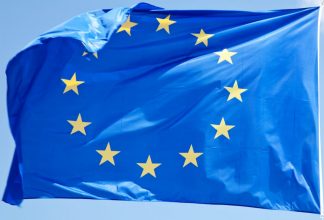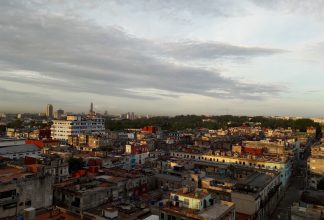EU-Cuba Agreement: Against Permanent Repression
Letter #12 by Amado Calixto Gammalame.
In July 2019, Civil Rights Defenders invited Cuban human rights defenders and civil society organisations to contribute with texts on how the European Union should work towards Cuba. This letter is written by Amado Calixto Gammalame.
EU-Cuba Agreement: Against Permanent Repression
Any analysis of the relations between Cuba and the European Union entails an explanation of the history of the island and its relations with other countries. This would make it easier to understand what and how future relations between the EU and Cuba should be.
Since its inception, the island maintained commercial and direct subordination relations with Europe. It was the last colony in America to gain independence from Spain. Its relations culminated in 1899.
From 1901 to 1959 with the foundation of the Republic, relations developed with the United States. The statistics and reports of the time describe the economic flourishing and the social development achieved, which is truncated and gradually ends after the triumph of the 1959 Revolution.
A socialist and Stalinistic political system is imposed, with a nationalisation and, sometimes, cooperativisation of the means of production. This caused the economy to collapse.
For sixty years the Communist Party, led first by Fidel and until today by his brother Raul Castro, has directed the country’s relations at their convenience; first with the USSR and the socialist camp, which ended with their collapse in 1989, and then with others.
The next lifeline was the arrival of Hugo Chavez to power in Venezuela, with which a “strategic alliance” is established between the two countries in the economic and political sectors.
In our time there is an economic disaster in Venezuela, led by the government of Nicolas Maduro. This has caused the Cuban government to desperately seek new economic scenarios, rather than political ones.
Cuba maintains close political relations with Venezuela, China, Russia, Bolivia, Nicaragua, Spain, and Mexico, among other countries.
The European Union, through the Charter of Fundamental Rights of the European Union, brings together all civil, political, economic and social rights of European citizens and of all people living in the territory of the European Union.
The fundamental rights are dignity, freedom, equality, solidarity, citizenship and justice; which are already included in the European Convention for the Protection of Human Rights, in the European Social Charter of the Council of Europe, in the Community Charter of Fundamental Social Rights of Workers and, likewise, in the constitutions of the Member States of the Union and in other international agreements signed by the States of the European Union.
The lack of freedoms in Cuba and the extremism of its government have reached the point of imprisoning peaceful activists and human rights defenders.
One of the most critical moments is what is known as the Black Spring of Cuba, which had to do with a series of arrests of government opponents that occurred during the spring of 2003.
Many dissidents were arrested, including doctors and journalists, who were subjected to summary trials.
The sentences applied in these judicial processes were based on Law 88 for the Protection of Cuba’s National Independence and Economy, better known as the “Gag Law”; a legal spawn used by the government to deter and intimidate people who dissent from communist ideology.
Those charged in these proceedings were accused of carrying out acts against the protection of Cuba’s national independence and economy and acts against the independence or territorial integrity or stability of the State.
The governments of the European Union; Pope John Paul II; human rights organisations such as Human Rights Watch, Reporters Without Borders and Amnesty International; and intellectuals and artists condemned these arrests.
Given the growing rise of the Cuban opposition movement, the government opted for repression and, under the umbrella of the Iraq war (thinking it would serve as media coverage for its excesses), launched the Black Spring, the largest recent act of repression against the opposition.
These actions, by contrast, led to the birth of other political actors such as the opposition movement known as Ladies in White, created in response to the imprisonment of their husbands and relatives.
Certain opposition groups on the island also began to rise and gain strength, such as the political reform project known as The Varela Project (its creator, the leader of the Christian Liberation Movement, died under obscure circumstances); the Manuel Marquez Sterling Independent Journalists Society, from which the magazine De Cuba emerged; The Patriotic Union of Cuba (UNPACU); The United Anti Totalitarian Forum and others.
The summary executions of three people prosecuted for terrorism and illegal possession of weapons and explosives, associated with the hijacking of a ferry in Havana, were also severely criticised internationally. After a detention of nine days, the death penalty was applied on April 11, 2003.
The maximum penalty defined by law in cases without serious injuries or death of a victim is 20 years of deprivation of liberty.
The talks between Cuba and the EU to modify the Common Position, as usual, were marked by secrecy and lack of transparency. That is the perception of the majority of Cuban civil society that promotes democracy in Cuba.
Notwithstanding the foregoing, we believe that there is a favourable framework for Cuba and the EU to establish relations, but with a minimum of adherence to the principles of international law, that may directly favour Cuban civil society.
The EU’s objectives towards Cuba during the implementation of the agreement should be based on respect for the rights of Cuban citizens, just as it is exercised towards its European citizens. The relations with the agencies, institutions, universities and companies in Cuba are not real because in Cuba none of these institutions is independent, it is the State that exercises total control of their activities with political and economic control.
The risks are obvious. Any cooperation would go through the government that is a ruling command and would not be focused on the Cuban people. It would swell the coffers of the Communist Party, which controls everything without being scrutinised or accountable to the citizens.
It would be discriminatory for the EU to link with institutions related to the government and loyal to the Communist Party and not with the rest of civil society.
Among the EU’s top priorities is to create a space for justice, freedom and security. The Treaty of Lisbon guarantees the freedoms and principles set forth in the Charter of Fundamental Rights of the European Union, whose provisions become legally binding.
The institutions of the European Union and the member states should enter into direct negotiations with Cuban civil society that promotes and defends democratisation and respect for human rights, through their commercial, diplomatic and other representations, even if they are not established physically in Cuba.
In the political and cooperation dialogue, certain aspects shall be discussed, such as:
- Citizens’ civic and decision-making participation, and
a multi-party system.
- the total liberation of the Cuban productive forces; nowadays there is a limited group of activities in which Cubans can practice private work.
- With regard to national investment, Cuban citizens living on the island cannot invest in their own country; the Foreign Investment Law is discriminatory.
- The issue of the ratification of the ICCPR and ICESCR that Cuba subscribed them in 2008 but has not yet ratified them.
European governments that have not yet ratified the agreement should not do so until the Cuban government does not meet a minimum of requirements that would correspond to the fundamentals and principles of operation of the EU member countries; namely independent powers, constitutional guarantees, ombudsmen, free practice of law.
The Constitution of Cuba, amended in 2019 in its article 5, says that the only the Communist Party of Cuba is the leading political force of society and the State.
The Constitution of the Republic of Cuba and other laws of lower hierarchy that establish a regulatory framework that essentially keeps the rights of citizens conditioned, are aimed at maintaining state control over citizens. The Law of Associations, Electoral Law, among others: in their articles certain rights are described, but then they are tied with restrictions that in practice are a dead letter of questionable application.
Amado Calixto Gammalame, Cuban Law Association
About Amado Calixto Gammalame
Amado Calixto Gammalame is a lawyer from the University of Havana (1981), with a Master’s degree in criminology. He was an Incumbent Professional Judge of the Supreme Court of the Republic of Cuba, Havana Court and the Court of the Special Municipality of the Isla de la Juventud. As of 2012, he started to defend Cubans and their human rights at the Cuban Law Association. He currently chairs the Cuban Law Association, coordinates the Pro Bono Legal Cuba project, and is a member of the Inclusive Culture Network of Cuba.

